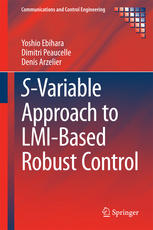

Most ebook files are in PDF format, so you can easily read them using various software such as Foxit Reader or directly on the Google Chrome browser.
Some ebook files are released by publishers in other formats such as .awz, .mobi, .epub, .fb2, etc. You may need to install specific software to read these formats on mobile/PC, such as Calibre.
Please read the tutorial at this link: https://ebookbell.com/faq
We offer FREE conversion to the popular formats you request; however, this may take some time. Therefore, right after payment, please email us, and we will try to provide the service as quickly as possible.
For some exceptional file formats or broken links (if any), please refrain from opening any disputes. Instead, email us first, and we will try to assist within a maximum of 6 hours.
EbookBell Team

4.0
66 reviewsThis book shows how the use of S-variables (SVs) in enhancing the range of problems that can be addressed with the already-versatile linear matrix inequality (LMI) approach to control can, in many cases, be put on a more unified, methodical footing. Beginning with the fundamentals of the SV approach, the text shows how the basic idea can be used for each problem (and when it should not be employed at all). The specific adaptations of the method necessitated by each problem are also detailed. The problems dealt with in the book have the common traits that: analytic closed-form solutions are not available; and LMIs can be applied to produce numerical solutions with a certain amount of conservatism. Typical examples are robustness analysis of linear systems affected by parametric uncertainties and the synthesis of a linear controller satisfying multiple, often conflicting, design specifications. For problems in which LMI methods produce conservative results, the SV approach is shown to achieve greater accuracy.
The authors emphasize the simplicity and easy comprehensibility of the SV approach and show how it can be implemented in programs without difficulty so that its power becomes readily apparent. The S-variable Approach to LMI-based Robust Control is a useful reference for academic control researchers, applied mathematicians and graduate students interested in LMI methods and convex optimization and will also be of considerable assistance to practising control engineers faced with problems of conservatism in their systems and controllers.